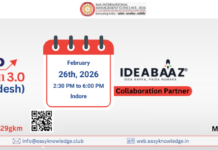MUMBAI, India | 24th December 2020: SVKM’s NMIMS, a legacy academic institute, held a path breaking ‘Digital Transformation Summit 2020’ from 17th to 19th of December to highlight the role of digital transformation in BFSI (banking, financial services, and insurance), e-commerce/supply chain, pharmaceuticals and healthcare sectors. The three-day virtual event was attended by a panel comprising of industry experts, business leaders, and academicians. The summit provided a timely platform for an animated exchange of information and ideas while exploring the best practices to avoid business disruptions.
The summit comes at a time when the process of digitalisation has been hastened as a strategy to ensure business continuity during the pandemic. It accelerated the process of digital transformation across various sectors in line with the fourth Industrial Revolution or Industry 4.0. The panelists discussed the state of digital transformation in their respective sectors and the challenges facing them.
The three-day event was broken down into three major themes where each day was dedicated to a particular sector. Day 1 was dedicated to the BFSI sector where the speakers discussed the state of digitisation and the areas of improvement. The panelists included Ms. Vishakha R M, MD & CEO of IndiaFirst Life Insurance; Mr. Vijay Chandok, MD & CEO ICICI Securities; Mr. Ramesh Iyer, Vice Chairman & MD, Mahindra and Mahindra Financial Services, Mr. Tridib Paul, Senior Vice President, BB&T Bank; and Mr. Samir Singh Jaini, CEO, The Digital Fifth. The talk was moderated by Prof. Geeta Iyer, Assistant Professor, Mukesh Patel School of Technology Management & Engineering (MPSTME). The sector was at the forefront of digitisation, helped by government policies on mandatory procedures for financial transactions. It has brought greater transparency, democratisation, and functionality. The challenges lied in ensuring data security, ensuring smoother coordination between technology and human skills, felt the panelists.
Moderated by Prof. Rajesh Prasad, Associate Professor, Marketing, Day 2 focused on the pharmaceutical and healthcare sectors where digitisation was relatively late to take off. The guest speakers were Mr. Rajesh Ramdurai, ED & COO Inzpera Healthsciences; Mr. Prateep Guha, Chairman, SPRINRIVER Technology Private Limited; India, Mr. Sylvester Johnson, Professor and Director of the Center for Humanities, Virginia Tech; Mr. Nickil Baswan, VP & Group Head Corporate Affairs & Policy, Cipla, and Ms. Naba Ghosh, Founding Director, WebRx, RxPONT, & Vaximum. The panelists agreed that it was the COVID-19 pandemic that had accelerated growth in every sphere, from making an appointment to diagnosis and delivery of medicines. The slow pace of digitisation across the industry and the inequalities of medical access were seen as the biggest challenges in the digital transformation of the sector.
The subject for Day 3 was the e-commerce/supply chain sector. Moderated by Prof. Vikram Sankhala, Assistant Professor, Business Intelligence & Data Analytics, MPSTME, the speakers were Mr. Rajgopal Nayak, Chief Technology Officer, Metro Brands Limited; Mr. Ravi Venkateshwar, Independent Consultant; Ms. Rekha Jain, Professor, IIMA; Mr. Deepak Bhosale, General Manager, IT, Asian Paints; Mr. Balamurali Rengarajan, Segment Head, Digital Consulting and Business Transformation, Larsen & Toubro Infotech. This sector saw tremendous disruptions due to the COVID-19 pandemic. The panelists attributed digitisation as the instrumental factor in overcoming these disruptions. The focus should shift towards a long-term strategy, rather than focusing on immediate returns of investment, felt the panelists. Technology coupled with human innovation would lay the foundation for the future.
The summit marked the increasing importance of digital transformation across different sectors and its capability to create value addition in every business function. The panelists agreed on the necessity of a more strategic implementation of digitalisation that focused on long-term goals with a human-centric approach.






